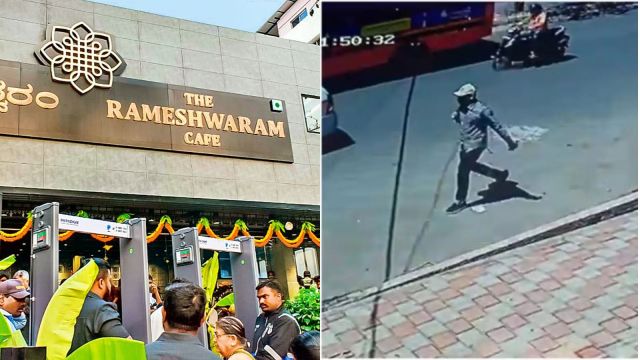Missing suspect from 2012 terror conspiracy case emerges as online handler of Rameshwaram Cafe blast plot
Mohammed Shahid Faisal is on the National Investigation Agency’s wanted list and carries a Rs 10 lakh reward in his name.
 Shazib, the suspect who planted an improvised explosive device at the cafe, and Taha, the alleged planner of the operation, were arrested in West Bengal on April 12. (Express Photo by Jithendra M/ Screengrab)
Shazib, the suspect who planted an improvised explosive device at the cafe, and Taha, the alleged planner of the operation, were arrested in West Bengal on April 12. (Express Photo by Jithendra M/ Screengrab)A missing suspect from a 2012 terrorism case in Bengaluru who is on the National Investigation Agency’s (NIA’s) wanted list and carries a Rs 10 lakh reward for arrest has been identified as the handler of a terror module involved in the March 1 blast at The Rameshwaram Cafe in Bengaluru this year.
Mohammed Shahid Faisal alias Zakir Ustad, 40, an engineering graduate from Bengaluru who went missing in 2012 following the unearthing of an alleged Lashkar-e-Taiba (LeT) linked terror plot, has been identified as the man who masqueraded as “Colonel” and “Bhai”, an online handler who communicated with the main accused and issued directions for recruitment, training, and terrorist acts, sources familiar with the probe said.
Faisal’s role as the handler of the alleged Islamic State (IS)-linked module involved in the Bengaluru blast has emerged following the NIA arrests of alleged perpetrators Mussavir Hussain Shazib, 30, and Abdul Matheen Taha, 30, and a conspirator Shoaib Mirza, 35, who served jail time for the 2012 plot.
Shazib, the suspect who planted an improvised explosive device at the cafe, and Taha, the alleged planner of the operation, were arrested in West Bengal on April 12.
Faisal is alleged to have provided nearly Rs 50,000 per month to Shazib and Taha through cryptocurrency routes so they could sustain themselves during the four years they were on the run after being identified as being associated with IS sympathisers in a case registered in Bengaluru in 2020, according to police sources.
The arrest that led to the handler
It was the NIA’s arrest of co-conspirator Shoaib Mirza in Karnataka on May 24 that led to Faisal’s identity as the alleged online handler of the module being revealed, sources said.
Mirza who served five years in jail for the 2012 LeT-linked terror plot is alleged to have been the intermediary through whom Faisal, who is suspected to be based abroad, established contact with the cafe blast accused in 2018 as part of efforts to create a homegrown module with overt allegiance to IS.
In May, following Mirza’s arrest, the NIA said he had “befriended and introduced accused Abdul Matheen Taha to an online handler suspected to be abroad”.
Mirza is alleged to have been a roommate of Taha’s relative in Bengaluru following his release from prison in 2018 after pleading guilty and serving a five-year term in the 2012 LeT conspiracy case. He is alleged to have connected Taha to Faisal.
“Mirza had further provided an e-mail ID for encrypted communication between the handler and Abdul Matheen Taha, who was arrested earlier on 12th April from his hideout in Kolkata (West Bengal) along with co-accused Mussavir Hussain Shazib,” the NIA said on May 24.
“Further investigations into the role of handler and larger conspiracy behind the blast, which left several injured and caused extensive damage to property are continuing,” the NIA said.
Handler linked to other cases too
Mohammed Shahid Faisal and his father-in-law Farhatullah Ghori, 60, who is also accused in the 2012 LeT conspiracy case, were reported to have taken shelter in Pakistan after they fled from India in 2012 in the wake of the LeT case.
Police sources said that Faisal is also linked to two other ongoing cases in Karnataka from 2021 through what is known as the Thirthahalli module which was created by Taha. Ten members of the module are linked to a trial blast case in the Shivamogga region in September 2021 and a cooker blast in Mangaluru in November 2021.
Since the arrest of Shazib and Taha, the NIA has taken the duo into custody for the probe of the Thirthahalli module as well. Sources said Faisal is likely to be named in the two cases linked to the module from 2021 as a result of the probe.
According to submissions made by the NIA in June to a special court for terrorism cases in Bengaluru, three key accused in the Thirthahalli trial blast case – Mohammed Shariq (who is also the main accused in the Mangaluru cooker blast case), Arafath Ali (who was sent back from the UAE in 2023) and Maaz Muneer (who is also accused in the cafe blast case) – were introduced “to the online hander of Islamic State” by Taha and others.
“They have further revealed that they were introduced to the online handler of Islamic State by accused No.12 (Taha) to further the activities of Islamic State the proscribed terrorist organisation,” the special court has noted. “The CIO has also collected information that they entered into cryptocurrency transactions with the online handler,” the court noted.
The 2012 LeT conspiracy case in Bengaluru
As many as 13 people served five-year jail terms in the LeT conspiracy case of 2012 after they pleaded guilty to the charges brought against them by the NIA.
In 2012, intelligence agencies and police reportedly picked up the trail of an alleged LeT recruitment plot after two youths, Dr Zafar Iqbal Sholapur and Abdul Hakeem Jamadar, from Hubli in Karnataka travelled to Pakistan via Iran in December 2011 to allegedly join the Taliban in Afghanistan. Monitoring of their activities after their return to India reportedly revealed they were in touch with LeT-linked Indian terror fugitives in Saudi Arabia.
Between August 29 and September 2, 2012, the Bengaluru police arrested 13 youths from Bengaluru, Hubli, Nanded and Hyderabad for allegedly being in touch with a group of nine Indian-origin terror fugitives based in Saudi Arabia, and linked to Pakistan’s LeT.
The Bengaluru police accused the 13 of plotting the assassination of right-wing Hindu leaders in Karnataka, Andhra Pradesh and Maharashtra.
The specific case against the youths was that two of them, Shoaib Ahmed Mirza and Abdul Hakeem Jamadar, plotted to kill a right-wing columnist in a Kannada newspaper, Pratap Simha, who later went on to become a BJP MP in 2014.
On September 15, 2016, a special terrorism court convicted the 13 arrested youths on all charges and sentenced them to five years in prison after the youths pleaded guilty. They were released in 2017 on completion of five years in prison.
The case is not closed yet since a separate chargesheet has been filed by the NIA against the persons who are absconding in the case, including Faisal. In the LeT conspiracy case, Faisal is accused of collecting weapons, recruiting men, identifying religious leaders as targets for killing to incite communal disharmony, and terrorism activities under the Unlawful Activities (Prevention) Act and the Arms Act.
On May 21 this year, the NIA carried out searches at 11 locations in Karnataka, Tamil Nadu, Telangana, and Andhra Pradesh at the premises linked with 11 suspects including “individuals convicted in the 2012 LeT Conspiracy case of Bengaluru and Hubli Districts” as part of the probe to identify the handler in the Bengaluru cafe blast case and others linked to the case.












